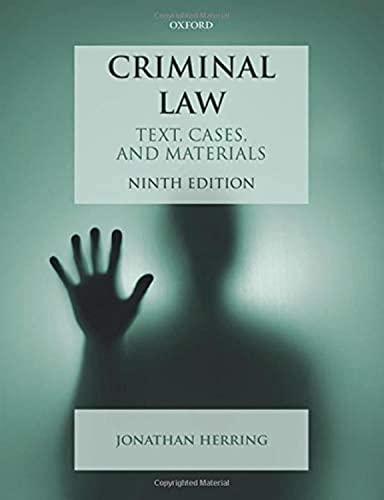Question
You are a summer clerk at a law firm in Tucson. The senior partner at the firm calls you into her office to discuss a
You are a summer clerk at a law firm in Tucson. The senior partner at the firm calls you into her office to discuss a new case that she would like you to work on. The firm is taking the case pro bono through the Volunteer Lawyers Program run by the state bar. The client, Susan Creaser, is a single mom who has just learned that her wages have been garnished for failure to repay a debt she owes - she bought a new large-screen TV set on credit so her three kids would have something to do over the hot summer when she was at work. She had been making regular payments on the debt but fell behind when the youngest of her children became ill, requiring her to pay for some unexpected medical expenses. The medical crisis is now over and Creaser can get back on track toward continued repayment of the debt. She has even managed to save a little bit of money to pay toward the debt at the end of the month, but if her wages are garnished she will be unable to support her children. She is very scared. The senior partner shows you a notice of the decision made by a court clerk to garnish Creaser's wages. In an interview with the Creaser, the partner had asked if this was the first she had heard about the garnishment, and Creaser said no - she had received a letter telling her the reasons why they might garnish her wages. The letter explainedthat her wages would be garnished in seven days, but that she was welcome to submit a written response, no greater than five pages, to respond to the reasons given for the garnishment. The letter also said that she was welcome to come to the administrative office of the court and review her file. Creaser did write something up and submitted it, but it was obviously unpersuasive because she got the notice of garnishment shortly after that. She did not review her file. She was never given an opportunity to call witnesses or make her case in person. She is very grateful that the firm has agreed to represent her in the debt collection lawsuit the creditor filed. The senior partner asks you to write a legal memorandum, analyzing all sides of the constitutional issue presented by this case.
Compose a concise document using the IRAC method and limit your answer to the following guidelines: (1) An Issue Statement (one sentence); (2) A Statement of the General Rule (one sentence); (3) An Analysis of the rules to the facts of the case (two paragraphs); and (4) A Conclusion (one paragraph)
Step by Step Solution
There are 3 Steps involved in it
Step: 1

Get Instant Access to Expert-Tailored Solutions
See step-by-step solutions with expert insights and AI powered tools for academic success
Step: 2

Step: 3

Ace Your Homework with AI
Get the answers you need in no time with our AI-driven, step-by-step assistance
Get Started


